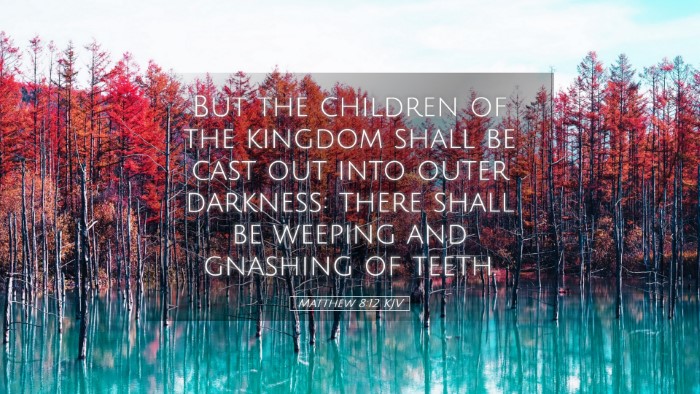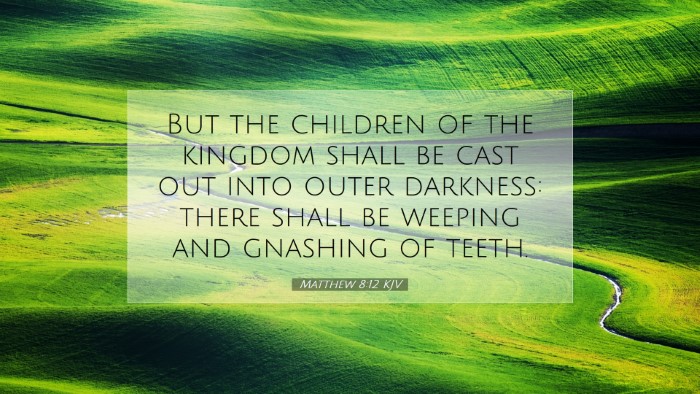Commentary on Matthew 8:12
Matthew 8:12 states, "But the children of the kingdom shall be cast out into outer darkness: there shall be weeping and gnashing of teeth." This verse serves as a stern warning regarding exclusion from the kingdom of heaven, emphasizing the consequences awaiting those who fail to inherit its promises.
Contextual Background
The passage is set within the broader narrative of Jesus’ ministry, where He demonstrates authority over sickness and death, as seen earlier in the chapter. The reference to the "children of the kingdom" primarily alludes to the Jews, the chosen people who had long awaited the Messiah yet often rejected His teachings. The centurion’s faith, contrasting with the doubts of those who were familiar with the Law, serves to illustrate a deeper spiritual truth about faith and acceptance in the kingdom.
Insights from Commentators
Matthew Henry
Henry emphasizes the alarming reality of being cast out from the kingdom, pointing to the external darkness as a symbol of God's judgment. He notes that the children of the kingdom, the Jews, represented those who presumed their place in the church and thought themselves secure. Their external lineage would not grant them immunity from damnation if they failed to embrace faith actively.
He articulates that the term "outer darkness" symbolizes not only physical separation from God but also spiritual disillusionment and despair. Such individuals confronted the harsh reality of their unfaithfulness and a true understanding of their condition. For Henry, the weeping and gnashing of teeth are expressions of profound regret and anguish that comes with the realization of lost opportunity and estrangement from divine grace.
Albert Barnes
Barnes comments on the phrase “children of the kingdom,” interpreting this as the Jews who believed themselves to be entitled to God’s favor due to their heritage. Instead of merely resting on their national identity, Barnes insists they must possess a genuine faith, reflecting the new covenant paradigm established by Jesus. He points out that the inability to accept the new revelation of God's will through Christ leads to their exclusion.
Moreover, Barnes articulates that the phrase "outer darkness" reflects a complete and foreboding separation from God's light, akin to hell or eternal judgment. He expounds that spiritual blindness can lead to catastrophic outcomes, warning listeners that privilege without true repentance results only in judgment. The vivid imagery of weeping and gnashing of teeth underlines the emotional and existential ramifications of one’s eternal state.
Adam Clarke
Clarke provides a detailed interpretation of the socio-religious implications surrounding this phrase. He draws attention to the nature of the kingdom and clarifies that not all who claim to be part of it will genuinely belong. He identifies the "children of the kingdom" as those who, despite their lineage and laws, are oftentimes resistant to the radical grace and renewal that Jesus represents.
Additionally, Clarke notes that the "outer darkness" metaphor is intensely significant, underscoring the idea of exclusion from divine presence. He links this back to the Jewish understanding of judgment, thus making the warning even more poignant for the original audience. His analysis presents the “weeping and gnashing of teeth” as vivid portrayals of despair among those who thought they were secure in the kingdom but found out upon judgment day that they were not.
Theological Implications
This verse stresses the critical importance of faith and repentance over mere association with God’s chosen people. The idea that the faithful who come from outside the traditional boundaries of Judaism will enter the kingdom while those who are genetically connected to it may face judgment serves as a radical reassessment of what it means to belong to God’s family.
- The inclusion versus exclusion theme: Belief in Christ, rather than ethnic or cultural identity, is paramount for entering God’s kingdom.
- The nature of divine judgment: The stark imagery employed calls believers to heed warnings about spiritual complacency and presumption.
- Recognition of spiritual blindness: This message is particularly relevant for those who may have grown up in faith traditions yet remain disconnected from the transformative power of true faith.
Practical Applications
For pastors and theologians, the implications of Matthew 8:12 are significant in approaching ministry in a contemporary context. The call to repentance and genuine faith is a timeless truth that transcends cultural and religious identities. In teaching this passage, it is essential to convey that God’s grace is available to all, yet requires active acceptance and acknowledgment of one’s need for redemption.
- Preach the necessity of faith: Encourage congregations to cultivate active faith that aligns with God’s will, recognizing their personal relationship with Jesus over traditionalism.
- Warn against complacency: Remind believers that privilege can lead to complacency and that continual renewal and transformation in Christ is vital.
- Emphasize grace for all: Highlight that faith, regardless of background, is what brings one into the kingdom of God, extending an invitation to the marginalized and those outside normative church boundaries.
Conclusion
Matthew 8:12 is a powerful reminder of the dynamics of faith concerning God’s kingdom. The children of the kingdom who may fall short serve as a cautionary example and reflect the scandalous grace of God that extends even to the likes of a centurion. Such a narrative challenges believers to reflect on their own relationship with Christ and earnestly pursue an authentic faith that leads to a fruitful life in the kingdom.


